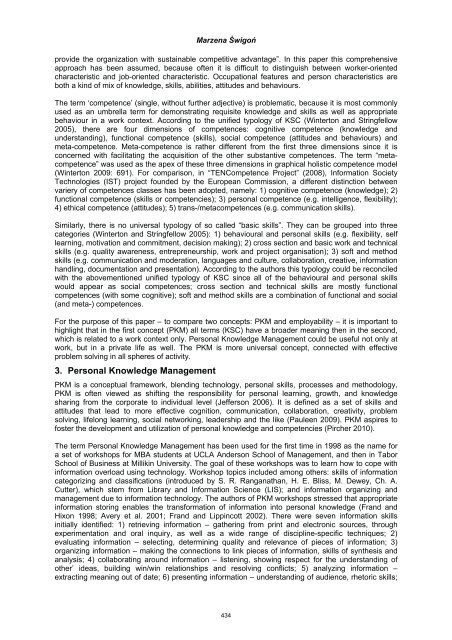Proceedings of the 3rd European Conference on Intellectual Capital
Proceedings of the 3rd European Conference on Intellectual Capital
Proceedings of the 3rd European Conference on Intellectual Capital
You also want an ePaper? Increase the reach of your titles
YUMPU automatically turns print PDFs into web optimized ePapers that Google loves.
Marzena Świgoń<br />
provide <str<strong>on</strong>g>the</str<strong>on</strong>g> organizati<strong>on</strong> with sustainable competitive advantage”. In this paper this comprehensive<br />
approach has been assumed, because <str<strong>on</strong>g>of</str<strong>on</strong>g>ten it is difficult to distinguish between worker-oriented<br />
characteristic and job-oriented characteristic. Occupati<strong>on</strong>al features and pers<strong>on</strong> characteristics are<br />
both a kind <str<strong>on</strong>g>of</str<strong>on</strong>g> mix <str<strong>on</strong>g>of</str<strong>on</strong>g> knowledge, skills, abilities, attitudes and behaviours.<br />
The term ‘competence’ (single, without fur<str<strong>on</strong>g>the</str<strong>on</strong>g>r adjective) is problematic, because it is most comm<strong>on</strong>ly<br />
used as an umbrella term for dem<strong>on</strong>strating requisite knowledge and skills as well as appropriate<br />
behaviour in a work c<strong>on</strong>text. According to <str<strong>on</strong>g>the</str<strong>on</strong>g> unified typology <str<strong>on</strong>g>of</str<strong>on</strong>g> KSC (Wintert<strong>on</strong> and Stringfellow<br />
2005), <str<strong>on</strong>g>the</str<strong>on</strong>g>re are four dimensi<strong>on</strong>s <str<strong>on</strong>g>of</str<strong>on</strong>g> competences: cognitive competence (knowledge and<br />
understanding), functi<strong>on</strong>al competence (skills), social competence (attitudes and behaviours) and<br />
meta-competence. Meta-competence is ra<str<strong>on</strong>g>the</str<strong>on</strong>g>r different from <str<strong>on</strong>g>the</str<strong>on</strong>g> first three dimensi<strong>on</strong>s since it is<br />
c<strong>on</strong>cerned with facilitating <str<strong>on</strong>g>the</str<strong>on</strong>g> acquisiti<strong>on</strong> <str<strong>on</strong>g>of</str<strong>on</strong>g> <str<strong>on</strong>g>the</str<strong>on</strong>g> o<str<strong>on</strong>g>the</str<strong>on</strong>g>r substantive competences. The term “metacompetence”<br />
was used as <str<strong>on</strong>g>the</str<strong>on</strong>g> apex <str<strong>on</strong>g>of</str<strong>on</strong>g> <str<strong>on</strong>g>the</str<strong>on</strong>g>se three dimensi<strong>on</strong>s in graphical holistic competence model<br />
(Wintert<strong>on</strong> 2009: 691). For comparis<strong>on</strong>, in “TENCompetence Project” (2008), Informati<strong>on</strong> Society<br />
Technologies (IST) project founded by <str<strong>on</strong>g>the</str<strong>on</strong>g> <str<strong>on</strong>g>European</str<strong>on</strong>g> Commissi<strong>on</strong>, a different distincti<strong>on</strong> between<br />
variery <str<strong>on</strong>g>of</str<strong>on</strong>g> competences classes has been adopted, namely: 1) cognitive competence (knowledge); 2)<br />
functi<strong>on</strong>al competence (skills or competencies); 3) pers<strong>on</strong>al competence (e.g. intelligence, flexibility);<br />
4) ethical competence (attitudes); 5) trans-/metacompetences (e.g. communicati<strong>on</strong> skills).<br />
Similarly, <str<strong>on</strong>g>the</str<strong>on</strong>g>re is no universal typology <str<strong>on</strong>g>of</str<strong>on</strong>g> so called “basic skills”. They can be grouped into three<br />
categories (Wintert<strong>on</strong> and Stringfellow 2005): 1) behavioural and pers<strong>on</strong>al skills (e.g. flexibility, self<br />
learning, motivati<strong>on</strong> and commitment, decisi<strong>on</strong> making); 2) cross secti<strong>on</strong> and basic work and technical<br />
skills (e.g. quality awareness, entrepreneurship, work and project organisati<strong>on</strong>); 3) s<str<strong>on</strong>g>of</str<strong>on</strong>g>t and method<br />
skills (e.g. communicati<strong>on</strong> and moderati<strong>on</strong>, languages and culture, collaborati<strong>on</strong>, creative, informati<strong>on</strong><br />
handling, documentati<strong>on</strong> and presentati<strong>on</strong>). According to <str<strong>on</strong>g>the</str<strong>on</strong>g> authors this typology could be rec<strong>on</strong>ciled<br />
with <str<strong>on</strong>g>the</str<strong>on</strong>g> abovementi<strong>on</strong>ed unified typology <str<strong>on</strong>g>of</str<strong>on</strong>g> KSC since all <str<strong>on</strong>g>of</str<strong>on</strong>g> <str<strong>on</strong>g>the</str<strong>on</strong>g> behavioural and pers<strong>on</strong>al skills<br />
would appear as social competences; cross secti<strong>on</strong> and technical skills are mostly functi<strong>on</strong>al<br />
competences (with some cognitive); s<str<strong>on</strong>g>of</str<strong>on</strong>g>t and method skills are a combinati<strong>on</strong> <str<strong>on</strong>g>of</str<strong>on</strong>g> functi<strong>on</strong>al and social<br />
(and meta-) competences.<br />
For <str<strong>on</strong>g>the</str<strong>on</strong>g> purpose <str<strong>on</strong>g>of</str<strong>on</strong>g> this paper – to compare two c<strong>on</strong>cepts: PKM and employability – it is important to<br />
highlight that in <str<strong>on</strong>g>the</str<strong>on</strong>g> first c<strong>on</strong>cept (PKM) all terms (KSC) have a broader meaning <str<strong>on</strong>g>the</str<strong>on</strong>g>n in <str<strong>on</strong>g>the</str<strong>on</strong>g> sec<strong>on</strong>d,<br />
which is related to a work c<strong>on</strong>text <strong>on</strong>ly. Pers<strong>on</strong>al Knowledge Management could be useful not <strong>on</strong>ly at<br />
work, but in a private life as well. The PKM is more universal c<strong>on</strong>cept, c<strong>on</strong>nected with effective<br />
problem solving in all spheres <str<strong>on</strong>g>of</str<strong>on</strong>g> activity.<br />
3. Pers<strong>on</strong>al Knowledge Management<br />
PKM is a c<strong>on</strong>ceptual framework, blending technology, pers<strong>on</strong>al skills, processes and methodology,<br />
PKM is <str<strong>on</strong>g>of</str<strong>on</strong>g>ten viewed as shifting <str<strong>on</strong>g>the</str<strong>on</strong>g> resp<strong>on</strong>sibility for pers<strong>on</strong>al learning, growth, and knowledge<br />
sharing from <str<strong>on</strong>g>the</str<strong>on</strong>g> corporate to individual level (Jeffers<strong>on</strong> 2006). It is defined as a set <str<strong>on</strong>g>of</str<strong>on</strong>g> skills and<br />
attitudes that lead to more effective cogniti<strong>on</strong>, communicati<strong>on</strong>, collaborati<strong>on</strong>, creativity, problem<br />
solving, lifel<strong>on</strong>g learning, social networking, leadership and <str<strong>on</strong>g>the</str<strong>on</strong>g> like (Pauleen 2009). PKM aspires to<br />
foster <str<strong>on</strong>g>the</str<strong>on</strong>g> development and utilizati<strong>on</strong> <str<strong>on</strong>g>of</str<strong>on</strong>g> pers<strong>on</strong>al knowledge and competencies (Pircher 2010).<br />
The term Pers<strong>on</strong>al Knowledge Management has been used for <str<strong>on</strong>g>the</str<strong>on</strong>g> first time in 1998 as <str<strong>on</strong>g>the</str<strong>on</strong>g> name for<br />
a set <str<strong>on</strong>g>of</str<strong>on</strong>g> workshops for MBA students at UCLA Anders<strong>on</strong> School <str<strong>on</strong>g>of</str<strong>on</strong>g> Management, and <str<strong>on</strong>g>the</str<strong>on</strong>g>n in Tabor<br />
School <str<strong>on</strong>g>of</str<strong>on</strong>g> Business at Millikin University. The goal <str<strong>on</strong>g>of</str<strong>on</strong>g> <str<strong>on</strong>g>the</str<strong>on</strong>g>se workshops was to learn how to cope with<br />
informati<strong>on</strong> overload using technology. Workshop topics included am<strong>on</strong>g o<str<strong>on</strong>g>the</str<strong>on</strong>g>rs: skills <str<strong>on</strong>g>of</str<strong>on</strong>g> informati<strong>on</strong><br />
categorizing and classificati<strong>on</strong>s (introduced by S. R. Ranganathan, H. E. Bliss, M. Dewey, Ch. A.<br />
Cutter), which stem from Library and Informati<strong>on</strong> Science (LIS); and informati<strong>on</strong> organizing and<br />
management due to informati<strong>on</strong> technology. The authors <str<strong>on</strong>g>of</str<strong>on</strong>g> PKM workshops stressed that appropriate<br />
informati<strong>on</strong> storing enables <str<strong>on</strong>g>the</str<strong>on</strong>g> transformati<strong>on</strong> <str<strong>on</strong>g>of</str<strong>on</strong>g> informati<strong>on</strong> into pers<strong>on</strong>al knowledge (Frand and<br />
Hix<strong>on</strong> 1998; Avery et al. 2001; Frand and Lippincott 2002). There were seven informati<strong>on</strong> skills<br />
initially identified: 1) retrieving informati<strong>on</strong> – ga<str<strong>on</strong>g>the</str<strong>on</strong>g>ring from print and electr<strong>on</strong>ic sources, through<br />
experimentati<strong>on</strong> and oral inquiry, as well as a wide range <str<strong>on</strong>g>of</str<strong>on</strong>g> discipline-specific techniques; 2)<br />
evaluating informati<strong>on</strong> – selecting, determining quality and relevance <str<strong>on</strong>g>of</str<strong>on</strong>g> pieces <str<strong>on</strong>g>of</str<strong>on</strong>g> informati<strong>on</strong>; 3)<br />
organizing informati<strong>on</strong> – making <str<strong>on</strong>g>the</str<strong>on</strong>g> c<strong>on</strong>necti<strong>on</strong>s to link pieces <str<strong>on</strong>g>of</str<strong>on</strong>g> informati<strong>on</strong>, skills <str<strong>on</strong>g>of</str<strong>on</strong>g> syn<str<strong>on</strong>g>the</str<strong>on</strong>g>sis and<br />
analysis; 4) collaborating around informati<strong>on</strong> – listening, showing respect for <str<strong>on</strong>g>the</str<strong>on</strong>g> understanding <str<strong>on</strong>g>of</str<strong>on</strong>g><br />
o<str<strong>on</strong>g>the</str<strong>on</strong>g>r’ ideas, building win/win relati<strong>on</strong>ships and resolving c<strong>on</strong>flicts; 5) analyzing informati<strong>on</strong> –<br />
extracting meaning out <str<strong>on</strong>g>of</str<strong>on</strong>g> date; 6) presenting informati<strong>on</strong> – understanding <str<strong>on</strong>g>of</str<strong>on</strong>g> audience, rhetoric skills;<br />
434
















